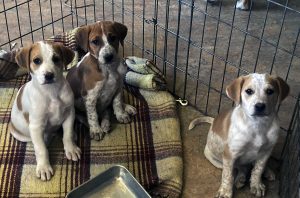Blackhat takes on daunting task of helping strays on the Navajo Nation.
“A caring person living in Kayenta retrieved them after they were weaned, but could not catch mom to spay her,” said Toby Frost, a Prescott resident who has been passionate about helping homeless animals for more than 20 years.
Frost has been fostering the three puppies. They have joined in at busy mealtimes, along with several other dogs, including three “forever foster” dogs who are unadoptable for various reasons, like Louie Louie, who has seizures and needs medication four times a day.
They are all living on the 40-acre spread in Williamson Valley where Frost lives with her husband, Ray Beckage. In addition, they are caring for four cats and some chickens right now.
Frost estimates she and her husband have fostered about 250 dogs through the years.
“There are so many semi-feral street dogs, my passion is grabbing some of the babies and hoping we can get the mom spayed,” she said. “A lot of the moms are not going to adapt. It’s called trap, neuter, return – a lot of the babies have a wonderful chance of being fitted into a home where they can be a family pet.”
Frost is a volunteer with Blackhat Humane Society, a non-profit that works to improve the quality of life of companion animals on the Navajo Nation. Sharing Frost’s passion for helping homeless animals is Cindy Yurth, the current president of the organization.
Yurth, a resident of Durango, Colorado, has been volunteering with Blackhat since 2005 after a sick, starving puppy showed up on a doorstep in Chinle where she was working.
“We pick up stray, unowned animals that are being fed or cared for by Good Samaritans and get them into foster homes where they are fixed, vaccinated and socialized, then find them permanent homes,” she said. “We place several hundred animals each year.”
Blackhat started unofficially in 2001 with Tamara Martin, who now runs Good Dog Rez-Q out of St. Johns, and some fellow employees of Sage Hospital in Ganado who became concerned about the number of stray animals in the Navajo Nation.
The organization was incorporated as a non-profit in 2003. This year marks its 20th anniversary. The name “Blackhat” comes from a rock formation in Tse Bonito, New Mexico, where the Double D veterinarian clinic was located.
The non-profit has foster families throughout the Four Corners region, including in Prescott.
Yurth keeps a waiting list of animals needing foster homes, puts out the weekly foster update email, writes articles for the newsletter, convenes board meetings, acts as the point of contact, and occasionally fosters and transports.
“The Navajo Nation is the only reservation I’m familiar with,” she said. “According to their animal control, there are an estimated 500,000 roaming dogs and cats, which is more than twice the human population. Many of these animals are actually owned, since most Navajos don’t keep their animals confined, but they’re still available to form packs that attack livestock and people and spread disease.”
The average lifespan of a reservation street dog is five years, she added. “They either get hit by a car, beaten up by another animal or succumb to diseases by not being vaccinated,” she said. “In comparison, the lifespan of a dog living in a home is about 10 to 15 years.”
Rusty is one of Blackhat’s success stories. Rusty was pregnant and homeless in Kayenta. She was living on pieces of hamburger given to her by tourists at McDonald’s.
Don and Sharon Stryker, who live and work in that area, regularly toss out kibble for street dogs and let Frost and others know about needy dogs they see. “They tell us, ‘Here’s some who are in dire straits, and they look like good dogs,’ and they always are,” Frost said.
Taken in by Lisa Grosso, a Blackhat volunteer in Prescott, Rusty gave birth to eight puppies in Grosso’s birthing room. “Lisa ended up adopting Rusty and every one of the puppies got into a fabulous home,” Front said.
Frost helped start the foster-based organization United Animal Friends. She also started another rescue group known as AARF and has worked with Yavapai Humane Trappers, which has an emphasis on search and rescue.
“All I want to do is foster and nurture the ones who need a paw up,” she said. “Some of these animals come off the Rez and they’re pretty raw.”
Frost says the problem is huge and multi-layered, including incidents of dog packs killing a child or elder. “Stray dogs also carry zoonotic diseases such as tick-borne infections and eyeworm,” she explained. “Just a few weeks ago, the Navajo Nation announced its veterinary clinics will no longer offer small animal care, which of course will exacerbate the problem. The last tribal veterinarian resigned last year, so there are currently no tribal veterinarians.”
It is daunting to keep up with the demand for low-cost, spay-neuter clinics on the reservation, although at least three non-profits come out to offer such clinics.
“There are animal shelters on the Nation, but the kill rate is so high most people don’t like to take their unwanted pets there, so they just turn them loose,” Yurth said.
Some pet supply stores, such as Petco in Prescott, are helping the non-profits by supplying free food for homeless animals.
Individuals can help by fostering a dog or covering the cost of a spay-neuter surgery.
“It’s about getting the word out so people understand about these 500,000 stray animals across four states that have no place to call home,” Frost said.
The organization is starting a Blackhat network of volunteers in Prescott. For more information, interested parties should visit blackhathumanesociety.org. QCBN
By Betsey Bruner, QCBN
Photo courtesy of Toby Frost: Cattle dog-mix puppies, Sydney, Jazmin and Cody, are ready for adoption. Their mom was homeless when they were born under a storage shed near Navajo Mountain.







Leave a Reply